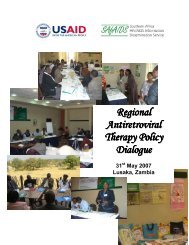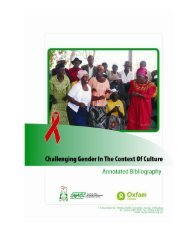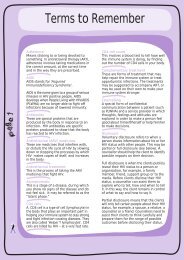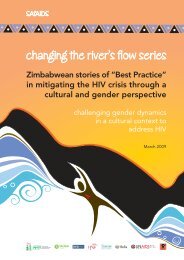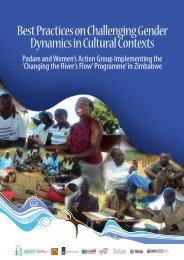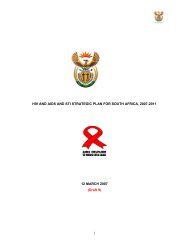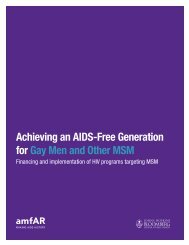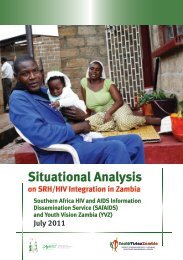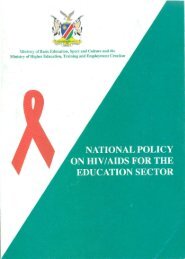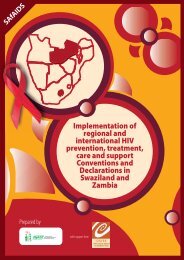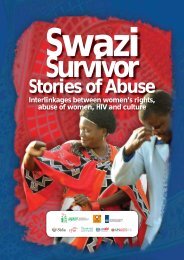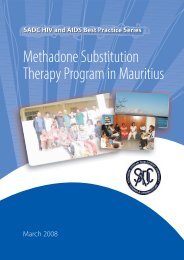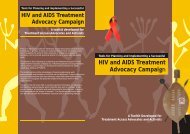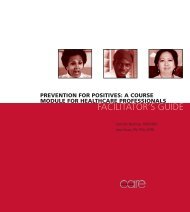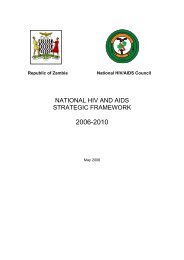A Success Story: The Etafeni Trust Fit for - SAfAIDS
A Success Story: The Etafeni Trust Fit for - SAfAIDS
A Success Story: The Etafeni Trust Fit for - SAfAIDS
Create successful ePaper yourself
Turn your PDF publications into a flip-book with our unique Google optimized e-Paper software.
4.2 <strong>Fit</strong> For Life, <strong>Fit</strong> <strong>for</strong> Work Programme Overview<br />
Since 2007, <strong>The</strong> <strong>Etafeni</strong> <strong>Fit</strong> For Life, <strong>Fit</strong> <strong>for</strong> Work Programme has supported young<br />
unemployed school-leavers in Nyanga, Cape Town to adopt a ‘fit <strong>for</strong> life’ approach to<br />
their future. <strong>The</strong> programme is four-weeks of initial life skills and SRH training offered<br />
to young men and women between the ages of 18 and 30 years from Nyanga. <strong>The</strong><br />
training programme admits 20 young men and women who have matriculated; who<br />
have a clean credit rating and no criminal record to participate in the programme.<br />
Sixty percent of trainees in each group are young women. Trainees enter into a<br />
contract with the organisation committing to adhere to the rules, which include no<br />
swearing or smoking or substance abuse within the grounds, to respect each other<br />
and the trainers at all times and to complete their training.<br />
Although interest in participating in the programme was initially low, after the<br />
inaugural group of trainees graduated in 2007 and were successfully placed in<br />
employment or tertiary institutions, the organisation found itself with long waiting lists<br />
of people wanting to participate. <strong>The</strong> recruitment process <strong>for</strong> the programme is mainly<br />
by word of mouth. People participating in other programmes at <strong>Etafeni</strong> also share<br />
in<strong>for</strong>mation. In July 2010 however, after realising that the quality of potential trainees<br />
was not at the preferred standard, staff at <strong>Etafeni</strong> took steps to improve on quality<br />
and streamline applications by advertising the training programme in the community<br />
newspaper, against set criteria.<br />
<strong>The</strong> training offered to young people was initially based on the Indian manual but the<br />
curriculum has now been revised, making it more appropriate <strong>for</strong> the southern African<br />
context. <strong>The</strong> <strong>Etafeni</strong> training programme aims to get young people to reflect on, <strong>for</strong><br />
a period of four weeks, what they need in a job and what is holding them back from<br />
achieving these goals.<br />
Each year eight or nine groups of 20 learners (with matric as an entry requirement)<br />
are run through a four-week life skills training programme. <strong>The</strong> programme aims to<br />
empower participants to make healthy life and sexual choices, thereby enhancing their<br />
self-confidence and furthering their ability to seek and obtain work. Overall, the aim<br />
of the programme is to place learners in productive employment at the end of each<br />
training cycle or assist them with further education and training opportunities that<br />
will lead them towards employment. <strong>The</strong> programme has been very successful in its<br />
application so far, demonstrating on average an overall placement rate of 80%. This<br />
placement rate includes short and mid-term placements in entry level jobs.<br />
However, the programme still struggles to establish a strong and continuous link with<br />
industry (potential employers), and thus is limited in creating long-term employment<br />
opportunities <strong>for</strong> the graduated learners. New ways of operating the programme,<br />
conducting the training and establishing industry links are being considered in order to<br />
close this significant gap on a sustainable basis. Furthermore, funders have prompted<br />
scale-up of the programme to offer school-leavers across the country the same<br />
opportunities of the <strong>Etafeni</strong> <strong>Fit</strong> For Life, <strong>Fit</strong> <strong>for</strong> Work Programme.<br />
<strong>The</strong> programme has been replicated in three other sites in South Africa (Hillbrow,<br />
Tzaneen and Vygrond) with some modifications and some differences in the<br />
application of the model. To date 120 graduates have passed through the programme<br />
each year <strong>for</strong> the past four years, generating a total of 480 learners trained. Sixty<br />
percent of the graduates are female, which is a positive impact of the programme.<br />
17



